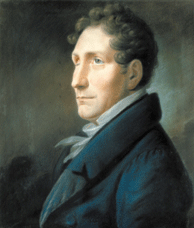Friedrich Kuhlau - Piano Concerto in C-major, Op.7 (1810)
Friedrich Kuhlau
Friedrich Daniel Rudolf Kuhlau
(1786 – 1832) / 정조 10년-순조 32년, 46세)
was a German-born Danish composer during the Classical and Romantic periods
Friedrich Kuhlau, pastel by Christian Horneman from 1828

Friedrich Daniel Rudolf Kuhlau (German; Danish sometimes Frederick Kulav)
(11 September 1786 – 12 March 1832) was a German-born Danish composer during the Classical and Romantic periods. He was a central figure of the Danish Golden Age and is immortalized in Danish cultural history through his music for Elves' Hill, the first true work of Danish National Romanticism and a concealed tribute to the absolute monarchy. To this day it is his version of this melody which is the definitive arrangement.
During his lifetime, Kuhlau was known primarily as a concert pianist and composer of Danish opera, but was responsible for introducing many of Beethoven's works, which he greatly admired, to Copenhagen audiences. Kuhlau was a prolific composer, as evidenced by the fact that although his house burned down, destroying all of his unpublished manuscripts, he still left a legacy of more than 200 published works in most genres.
Piano Concerto in C-major, Op.7 (1810)
Work: Piano Concerto in C-major, Op.7 (1810, published in 1812)
Mov.I: Allegro 00:00
Mov.II: Adagio 16:54
Mov.III: Rondo: Allegro 25:01
Pianist: Amalie Malling
Orchestra: The Danish National Radio Symphony Orchestra
Conductor: Michael Schønwandt
1. Allegro 2. Adagio 3. Rondo: Allegro
Felicja Blumental, piano and the Salzburg Symphony Orchestra conducted by Theodore Guschlbauer
recorded: Salzburg 1969 Brana Records BR0016
He was a central figure of the Danish Golden Age and is immortalized in Danish cultural history through his music for Elves' Hill, the first true work of Danish National Romanticism and a concealed tribute to the absolute monarchy. To this day it is his version of this melody which is the definitive arrangement.
During his lifetime, Kuhlau was known primarily as a concert pianist and composer of Danish opera, but was responsible for introducing many of Beethoven's works, which he greatly admired, to Copenhagen audiences. Kuhlau was a prolific composer, as evidenced by the fact that although his house burned down, destroying all of his unpublished manuscripts, he still left a legacy of more than 200 published works in most genres.
